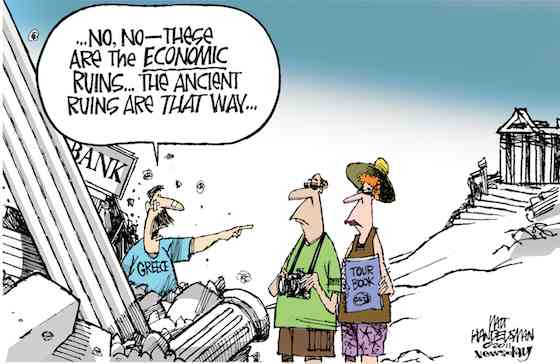- MENU
- HOME
- SEARCH
- WORLD
- MAIN
- AFRICA
- ASIA
- BALKANS
- EUROPE
- LATIN AMERICA
- MIDDLE EAST
- United Kingdom
- United States
- Argentina
- Australia
- Austria
- Benelux
- Brazil
- Canada
- China
- France
- Germany
- Greece
- Hungary
- India
- Indonesia
- Ireland
- Israel
- Italy
- Japan
- Korea
- Mexico
- New Zealand
- Pakistan
- Philippines
- Poland
- Russia
- South Africa
- Spain
- Taiwan
- Turkey
- USA
- BUSINESS
- WEALTH
- STOCKS
- TECH
- HEALTH
- LIFESTYLE
- ENTERTAINMENT
- SPORTS
- RSS
- iHaveNet.com
By Vittorio Hernandez

Athens, Greece
A day after winning a confidence vote in the Greek Parliament, the country's cabinet approved austerity measures for the 2012 to 2015 budgets and laws for the measures' application.
The measures include $40 billion (EUR 28 billion) of spending cuts, tax increases, fiscal reforms and sale of government assets.
The next step for the financially challenged government is to secure the approval of the parliament where the ruling party of Prime Minister George Papandreou has enough numbers to pass the measures. However, unlike the confidence vote in which all members of the Socialist Party rallied behind the government, some MPs from the party also oppose the austerity measures.
Papandreou will have to convince the public, who have held several protests the past weeks over the belt-tightening measures. Ahead of the Parliament's approval of the measures, protesters warned Athens of a major day of action when legislature votes on the issue next week.
Parliamentary approval is required by the European Union and the International Monetary Fund for the two bodies to release the second tranche of Greece's bailout.
Despite Papandreou's government winning a vote of confidence, Pimco, the world's largest bond fund, opined that Greece would still likely default on its debts. Pimco Chief Executive Mohamed El-Erian said in a video conference in Taipei that Greece's way to solve its financial problem is through a default.
The Pimco executive based his bleak outlook on the Greek government failing to enact measures that would enhance the country's growth and the fact that no single economic indicator has shown strength due to fears that a restructuring would hurt European banks.
El-Erian said the EU and IMF are risking wasting their funds on the ailing Greek economy. But he said a Greek default alone would not trigger another round of global financial crisis because Greece is too small to create an economic impact on the international community.
He said other eurozone members, particularly Ireland, Portugal, Italy and Spain, must also default on their loans to negatively impact the global financial community.
Available at Amazon.com:
Aftermath: Following the Bloodshed of America's Wars in the Muslim World
Displacement and Dispossession in the Modern Middle East (The Contemporary Middle East)
The End of History and the Last Man
The Clash of Civilizations and the Remaking of World Order
The Tragedy of Great Power Politics
The End of the Free Market: Who Wins the War Between States and Corporations?
Running Out of Water: The Looming Crisis and Solutions to Conserve Our Most Precious Resource
Bottled and Sold: The Story Behind Our Obsession with Bottled Water
Water: The Epic Struggle for Wealth, Power, and Civilization
At War with the Weather: Managing Large-Scale Risks in a New Era of Catastrophes
Friendly Fire: Losing Friends and Making Enemies in the Anti-American Century
Dining With al-Qaeda: Three Decades Exploring the Many Worlds of the Middle East
Uprising: Will Emerging Markets Shape or Shake the World Economy
WORLD |
AFRICA |
ASIA |
EUROPE |
LATIN AMERICA |
MIDDLE EAST |
UNITED STATES |
ECONOMICS |
EDUCATION |
ENVIRONMENT |
FOREIGN POLICY |
POLITICS
World - Greek Cabinet Approves Austerity Measures; Debt Default Still Possible | Global Viewpoint